They Shall Seek Peace And Not Find It
By Brian E. Muhammad, Staff Writer- April 5, 2022
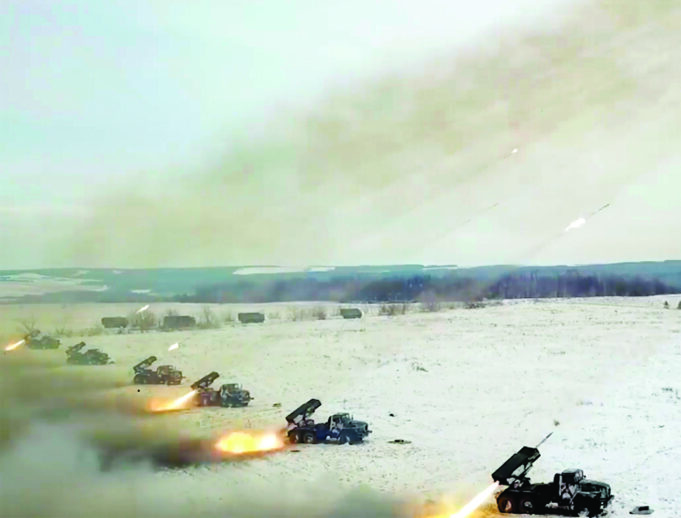 \
\More fuel on the fire of war halts road to peace
“Destruction hath come, And they have sought peace, and there is none”—Bible, Ezekiel 7:25
Bombs keep falling and fighting continues despite Russia’s promise to scale back attacks on Ukraine’s capital city and a nearby territory. Diplomatic peace and ceasefire talks brokered by Turkey rendered cautious optimism by some observers in the deadly Russia-Ukraine war that has killed thousands and displaced millions of people. But what does peace look like amid continued conflict, distrust and nations jockeying for strategic positions and power?
At presstime negotiators from each side resumed video talks even as Kyiv accused Moscow’s forces of carrying out atrocities in towns in the north, reported several news outlets. Mass graves were reported in the town of Bucha, near Kyiv. The latest developments may possibly “complicate” peace talks stated President Volodymyr Zelenskiy of Ukraine.
Mr. Zelenskiy charged that the abuses are genocide. The European Union (EU) called for increased sanctions on Russia. The Kremlin dismissed the accusations about Bucha and argued the accusations by Ukraine “should be treated with skepticism.” Ukraine negotiators announced that enough inroads during peace talks with Russian officials were made to warrant a face-to-face between Zelenskiy and Putin. Ukraine chief negotiator David Arakhamia said on April 2 that a draft peace treaty proposed by Ukraine was “verbally accepted” by Russia except on the question of Crimea, a territory Russia annexed in 2014.
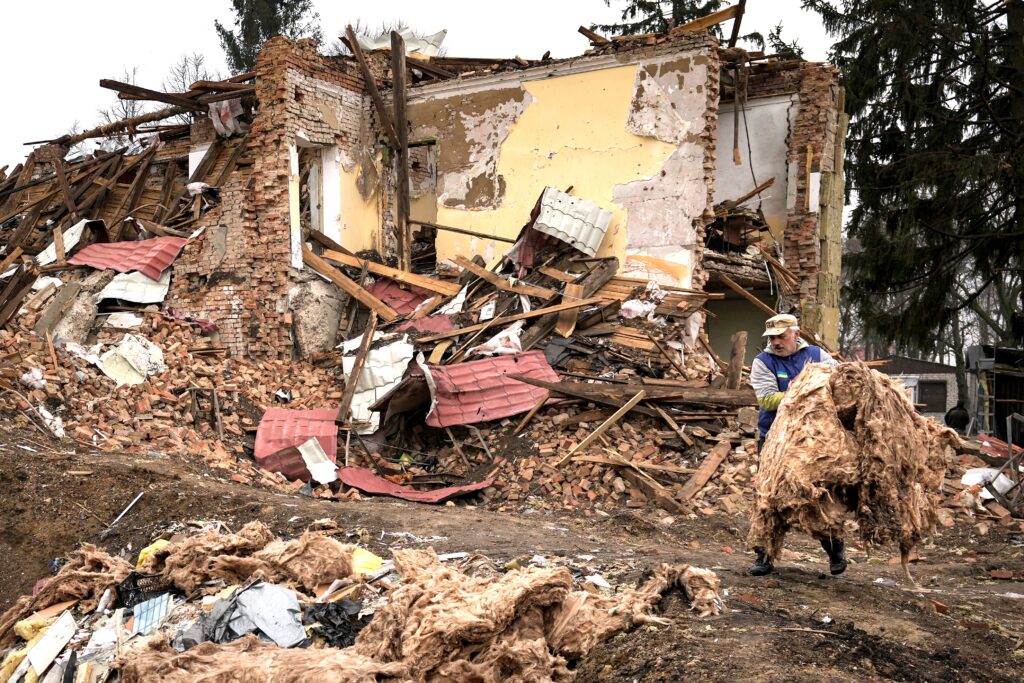
Russia Ukraine War Day In Photos
The meeting site if one takes place, was not clear by Final Call presstime but could possibly happen in Istanbul or Ankara, Turkey. Although the development was considered progress amid contentious talks, conflict has not halted.
Since the beginning of Russia’s invasion of its neighbor that has leveled cities, world leaders and international bodies have been in search of peace and a solution but are finding neither.
“It’s very difficult at this point to achieve a peace in Ukraine because Russia has not achieved its objectives in the war,” said John Feffer, director of the Foreign Policy in Focus at the Institute of Policy Studies.
He said it was clear from the battle strategy and statements from Mr. Putin that the objective was to seize as much Ukrainian territory as possible, replace the government with a pro-Russian regime and impose a status of neutrality.
According to The Guardian, Ukraine had offered to accept becoming neutral if it receives adequate security guarantees from Western nations and abandons its aspirations to join NATO (North Atlantic Treaty Organization). “But those moves would require amending the constitution or a referendum, neither of which can be done in wartime, analysts say,” the publication reported.
Under international law, a country is neutral if it won’t interfere in situations of international armed conflict involving other belligerent parties. It cannot allow a belligerent party to use its territory as a base of military operations, take sides or supply military equipment, noted theguardian.com.
From most accounts, Russia’s objective has fallen flat. “Basically, Russia has failed to do that, although the issue of neutrality is now on the negotiating table,” said Mr. Feffer. “From that point of view there has been some movement toward perhaps a compromised position,” he told The Final Call.
No peace on the horizon
The meeting site if one takes place, was not clear by Final Call presstime but could possibly happen in Istanbul or Ankara, Turkey. Although the development was considered progress amid contentious talks, conflict has not halted.
Since the beginning of Russia’s invasion of its neighbor that has leveled cities, world leaders and international bodies have been in search of peace and a solution but are finding neither.
“It’s very difficult at this point to achieve a peace in Ukraine because Russia has not achieved its objectives in the war,” said John Feffer, director of the Foreign Policy in Focus at the Institute of Policy Studies.
He said it was clear from the battle strategy and statements from Mr. Putin that the objective was to seize as much Ukrainian territory as possible, replace the government with a pro-Russian regime and impose a status of neutrality.
According to The Guardian, Ukraine had offered to accept becoming neutral if it receives adequate security guarantees from Western nations and abandons its aspirations to join NATO (North Atlantic Treaty Organization). “But those moves would require amending the constitution or a referendum, neither of which can be done in wartime, analysts say,” the publication reported.
Under international law, a country is neutral if it won’t interfere in situations of international armed conflict involving other belligerent parties. It cannot allow a belligerent party to use its territory as a base of military operations, take sides or supply military equipment, noted theguardian.com.
From most accounts, Russia’s objective has fallen flat. “Basically, Russia has failed to do that, although the issue of neutrality is now on the negotiating table,” said Mr. Feffer. “From that point of view there has been some movement toward perhaps a compromised position,” he told The Final Call.
No peace on the horizon
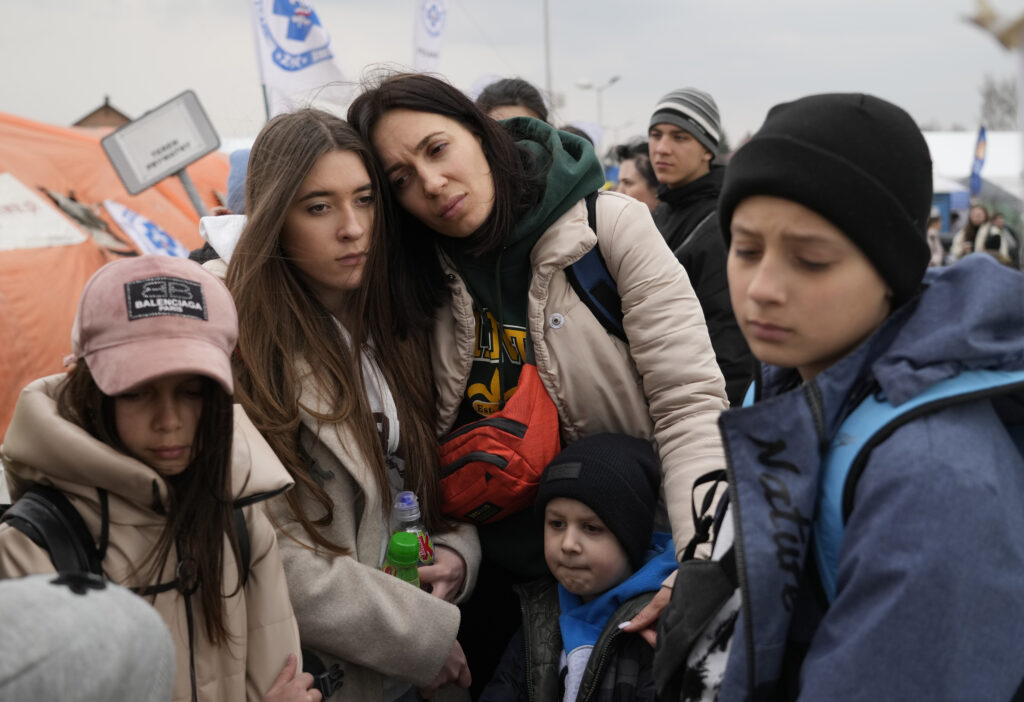
Refugees wait in a queue, after fleeing the war from neighbouring Ukraine at the border crossing in Medyka, southeastern Poland, on Tuesday, March 29, 2022. The daily number of people fleeing Ukraine has fallen in recent days but border guards, aid agencies and refugees say Russia’s unpredictable war offers few signs whether it’s just a temporary lull or a permanent drop-off. (AP Photo/Sergei Grits)
America, EU, NATO, and the G-7 are talking peace and mitigating war, but as the scriptures say: “While they talk Peace, the sword reaches to the sword.”
Political commentator Kevin Alexander Gray told The Final Call, the pathway for peace is to face the fundamental problem of expansionism by multiple parties.
“The EU, NATO and the United States have to agree not to expand NATO; and Russia needs to agree not to expand into those borderline states, that really want to be connected to Europe,” said Mr. Gray.
Russia’s broken pledge paired with America’s and Western nations boosting armaments of war to Ukraine and increasing troop levels in bordering NATO countries is adding fuel to the fire of war.
The Honorable Minister Louis Farrakhan warned the world that America will be pulled into this war during his monumental address, “The Swan Song,” delivered February 27 at Nation of Islam headquarters in Chicago. The Minister shared his observation of the conflict from a divine and spiritual perspective rooted in scripture and as Allah’s (God’s) Servant in the world.
“Putin, Putin, Putin now you’re out there Mr. President. You are out there. Look at what’s happening: I don’t know who is winning because I am not aware of the facts. But they tell me the Ukrainians are fighting back. If the Ukrainians are fighting back; you are feeling it. Otherwise why would you call Ukrainian President Volodymyr Zelenskiy a Nazi?” the Minister said during his message that was broadcast around the world.
“Others say: ‘No, no, no. He’s not a Nazi. He’s Jewish.’ Zelenskiy said he’s not giving up. You’re going to pay a price. You feel strong but look at how God will take the Ukrainian people and shame you. Big bad Russia. You should never have come at them like that. So now you’re feeling some heat inside your own house. But you’re not going to stop,” warned Min. Farrakhan.
His teacher also prophesized of what is on the horizon.
“We do not hope for peace as long as we add to the war that which serves as fuel to a fire,” wrote the Most Honorable Elijah Muhammad in His book “Our Saviour has Arrived.” “The fire cannot go out as long as we keep it burning by adding more fuel. A dying, burning fire is increased when more fuel is thrown into it,” he wrote.
The conflict has brought the nations to the brink of World War III, also known as the dreaded war of Armageddon in the scriptures.
Russian forces bombed areas around Kyiv and another city after vowing to ease operations in those zones to promote trust between the two sides, Ukrainian authorities said March 30.
At least 1,100 civilians have been killed in a month of fighting in Ukraine, a senior UN humanitarian official told the Security Council, stressing that the conflict “shows no signs of abating.”
“Cities, like Mariupol, Kharkiv, Chernihiv and many others—bustling and full of life just one month ago—are encircled, bombarded and blockaded,” said Joyce Msuya, assistant secretary-general for Humanitarian Affairs.
She emphasized that at least 99 children are among the dead and injured, as hospitals, homes and schools were destroyed.
During peace talks Ukrainian officials outlined possible concessions on disputed territory occupied by Russia. On the condition of a ceasefire, a 15-year consultation process was considered around the status of Crimea. The diplomats discussed Ukraine assuming a neutral status in exchange for international security guarantees. The status means a country agrees not to enter international security alliances. For Ukraine, it would likely mean giving up its longstanding effort to join NATO and not allowing foreign military bases on Ukrainian soil. However, if achieved the arrangement wouldn’t guarantee a lasting peace because Ukraine’s military strength will still depend on armament from America and Western powers which are Russian adversaries.
America, EU, NATO, and the G-7 are talking peace and mitigating war, but as the scriptures say: “While they talk Peace, the sword reaches to the sword.”
Political commentator Kevin Alexander Gray told The Final Call, the pathway for peace is to face the fundamental problem of expansionism by multiple parties.
“The EU, NATO and the United States have to agree not to expand NATO; and Russia needs to agree not to expand into those borderline states, that really want to be connected to Europe,” said Mr. Gray.
Russia’s broken pledge paired with America’s and Western nations boosting armaments of war to Ukraine and increasing troop levels in bordering NATO countries is adding fuel to the fire of war.
The Honorable Minister Louis Farrakhan warned the world that America will be pulled into this war during his monumental address, “The Swan Song,” delivered February 27 at Nation of Islam headquarters in Chicago. The Minister shared his observation of the conflict from a divine and spiritual perspective rooted in scripture and as Allah’s (God’s) Servant in the world.
“Putin, Putin, Putin now you’re out there Mr. President. You are out there. Look at what’s happening: I don’t know who is winning because I am not aware of the facts. But they tell me the Ukrainians are fighting back. If the Ukrainians are fighting back; you are feeling it. Otherwise why would you call Ukrainian President Volodymyr Zelenskiy a Nazi?” the Minister said during his message that was broadcast around the world.
“Others say: ‘No, no, no. He’s not a Nazi. He’s Jewish.’ Zelenskiy said he’s not giving up. You’re going to pay a price. You feel strong but look at how God will take the Ukrainian people and shame you. Big bad Russia. You should never have come at them like that. So now you’re feeling some heat inside your own house. But you’re not going to stop,” warned Min. Farrakhan.
His teacher also prophesized of what is on the horizon.
“We do not hope for peace as long as we add to the war that which serves as fuel to a fire,” wrote the Most Honorable Elijah Muhammad in His book “Our Saviour has Arrived.” “The fire cannot go out as long as we keep it burning by adding more fuel. A dying, burning fire is increased when more fuel is thrown into it,” he wrote.
The conflict has brought the nations to the brink of World War III, also known as the dreaded war of Armageddon in the scriptures.
Russian forces bombed areas around Kyiv and another city after vowing to ease operations in those zones to promote trust between the two sides, Ukrainian authorities said March 30.
At least 1,100 civilians have been killed in a month of fighting in Ukraine, a senior UN humanitarian official told the Security Council, stressing that the conflict “shows no signs of abating.”
“Cities, like Mariupol, Kharkiv, Chernihiv and many others—bustling and full of life just one month ago—are encircled, bombarded and blockaded,” said Joyce Msuya, assistant secretary-general for Humanitarian Affairs.
She emphasized that at least 99 children are among the dead and injured, as hospitals, homes and schools were destroyed.
During peace talks Ukrainian officials outlined possible concessions on disputed territory occupied by Russia. On the condition of a ceasefire, a 15-year consultation process was considered around the status of Crimea. The diplomats discussed Ukraine assuming a neutral status in exchange for international security guarantees. The status means a country agrees not to enter international security alliances. For Ukraine, it would likely mean giving up its longstanding effort to join NATO and not allowing foreign military bases on Ukrainian soil. However, if achieved the arrangement wouldn’t guarantee a lasting peace because Ukraine’s military strength will still depend on armament from America and Western powers which are Russian adversaries.
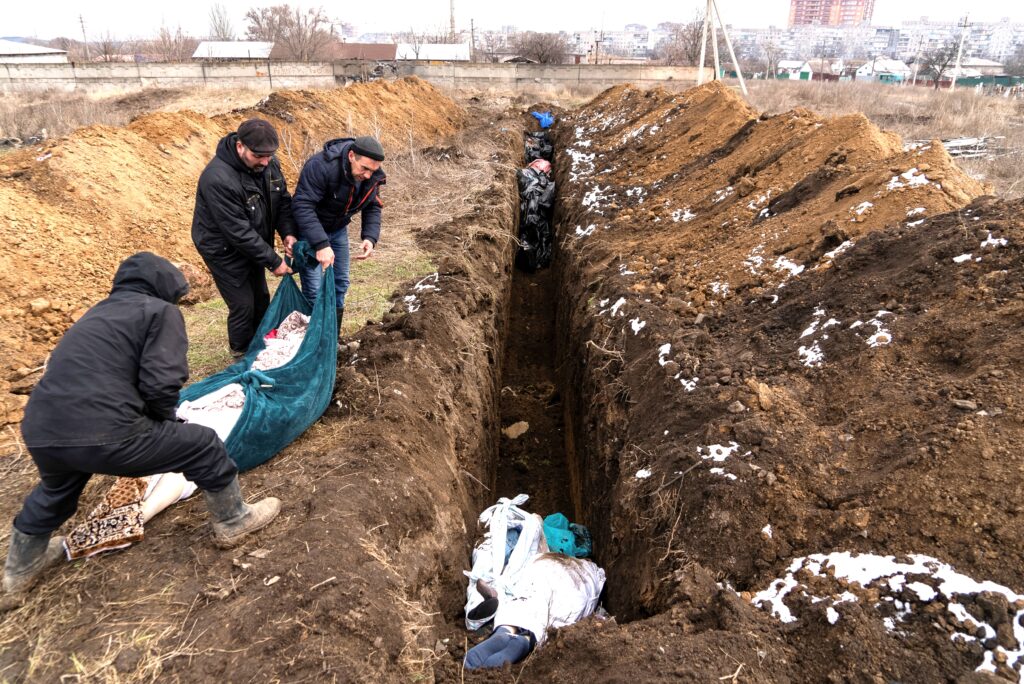
With heightening fears of the Eastern European conflict continuing to spiral downward with serious impacts on around the world, there is a lot riding on finding any resemblance of what could be considered peace.
Ripple effects of war
As negotiations for peace struggle along, pressure on other parts of the world thickens. The war is showing ripples of trouble across the globe. While Russia was placed under economic sanctions to force Mr. Putin to submission through squeezing the economy, European nations are beginning to suffer.
Clapping back against the U.S.-Western sanctions, Mr. Putin signed a decree, ordering foreign buyers of gas to pay in local rubles instead of euros starting April 1. Energy ministers at the G-7 industrialized nations rejected the ultimatum and countries like Germany, Greece and the Netherlands moved to use other means for supply.
Russia provides Europe 40 percent of its gas needs and it exported around 155 billion cubic meters to Europe last year. Without it, Europe would have to buy more gas on the spot market where prices are already around 500 percent higher than last year.
With disruptions, Russia stands to lose a main source of income. Europe has much to lose as businesses and households are already in the throes of record high energy prices.
The speaker of Russia’s upper house of parliament, Valentina Matviyenko, said Moscow was ready if Europe refused to buy Russian energy and could redirect supplies to Asian markets among others, TASS news agency reported.
At the ire of America and the EU, both China and India made commitments to buy Russian oil at steep discount prices.
Beyond oil prices, grain and agricultural implications could impact Africa. There is significant agricultural trade between African countries and Russia and Ukraine. As Europe is impacted, the Middle East is impacted and Africa although, not spared by the war, like India and China has taken an independent stance on the matter.
In a visit to the continent on March 31 Jessica Lapenn, U.S. ambassador to the African Union, sought a “a strong African response” to the Russian invasion and plans to help lessen the economic effects of the conflict on Senegal, she said.
“We look for a strong African response to Russian aggression and welcome the opportunity to partner with Senegal and other Africans on both the response to Russia’s aggression but also to address the implications of it globally,” she told journalists in Dakar, Senagal.
Senegal’s President Macky Sall currently holds the African Union’s rotating presidency.
In UN votes in March nearly half of all African countries abstained or did not vote in resolutions condemning Russia and calling for an immediate cessation of fighting.
In 2020, African countries imported agricultural products worth $4 billion from Russia. Wheat accounted for approximately 90 percent of these imports. Egypt was the largest importer, followed by Sudan, Nigeria, Tanzania, Algeria, Kenya, and South Africa.
Similarly, Ukraine exported agricultural products worth $2.9 billion to the continent in 2020. Wheat accounted for roughly 48 percent of this, maize 31 percent, and sunflower oil, barley, and soybeans accounted for the remainder.
The ongoing war could affect supply chains and raise the cost of imports.
Political analyst Abayomi Azikiwe said the position that African countries took abstaining from signing on to the U.S. anti-Russia position is based on past relations.
“The history of the former Soviet Union, in terms of their support for progressive liberation movements and revolutionary governments in Africa is sealed,” said Mr. Azikiwe. “There’s still that collective memory on the part of people on the continent and people throughout the world,” he added.
The conflict in Ukraine also revealed a pro-Russian sentiment in Africa. In Mali, the Central African Republic, and Ethiopia were demonstrations supporting Russia in the Ukrainian conflict. “It’s a lesson for the United States,” Mr. Azikiwe told The Final Call. He said African nations not readily falling under the influence of America is a point of worry in Washington.
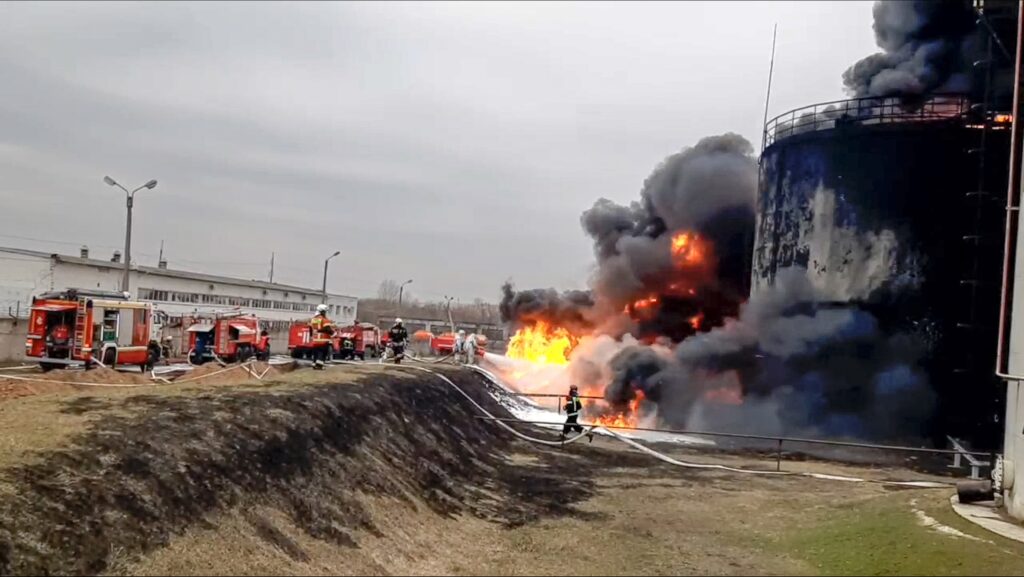
In this handout photo released by Russian Emergency Ministry Press Service on Friday, April 1, 2022, firefighters work at the site of fire at an oil depot in Belgorod region, Russia. The governor of the Russian border region of Belgorod accused Ukraine of flying helicopter gunships into Russian territory and striking an oil depot Friday morning. The depot is run by Russian energy giant Roseneft about 21 miles from the border. The governor says it was set ablaze by the attack that left two people injured. If confirmed, it would be the first attack of its kind by Ukrainian forces inside Russia. (Russian Emergency Ministry Press Service via AP)
America is feeling the domino effect of the conflict. Factors ill effecting Americans is a projection of famine on the horizon while the country is still experiencing the economic strain of Covid-19.
Millions of Americans are being hit with increases in gas prices exacerbated even higher by the war. Americans on average use about 21 million barrels of oil daily, with about 40 percent of the consumption devoted to gasoline, according to the U.S. Energy Information Administration.
President Joe Biden is ordering the release of one million barrels of oil per day from the nation’s petroleum reserve for six months, the White House announced March 31. The effort is a bid to control energy prices that soared as the U.S. and allies imposed steep sanctions on Russia.
The move by Mr. Biden shows that oil is a vulnerable spot for America at home and abroad. Higher prices have damaged Mr. Biden’s approval domestically.
Polls released late March by NBC News shows that 57 percent of respondents believe the U.S. is already at war with Russia, or that it will be within the next year. Of those, 41 percent believe the U.S. is on the brink of war with Russia and will be in direct military conflict with the country soon. Sixteen percent said the U.S. is already at war with Russia.
Either way, peace is not on the horizon. “There is no doubt in anyone’s mind today that the condition of the nations is such that needs a ruler who is not involved in the present world of corruption to bring about peace and good will among the people of the earth,” said the Honorable Elijah Muhammad. (Final Call staff contributed to this report.)
America is feeling the domino effect of the conflict. Factors ill effecting Americans is a projection of famine on the horizon while the country is still experiencing the economic strain of Covid-19.
Millions of Americans are being hit with increases in gas prices exacerbated even higher by the war. Americans on average use about 21 million barrels of oil daily, with about 40 percent of the consumption devoted to gasoline, according to the U.S. Energy Information Administration.
President Joe Biden is ordering the release of one million barrels of oil per day from the nation’s petroleum reserve for six months, the White House announced March 31. The effort is a bid to control energy prices that soared as the U.S. and allies imposed steep sanctions on Russia.
The move by Mr. Biden shows that oil is a vulnerable spot for America at home and abroad. Higher prices have damaged Mr. Biden’s approval domestically.
Polls released late March by NBC News shows that 57 percent of respondents believe the U.S. is already at war with Russia, or that it will be within the next year. Of those, 41 percent believe the U.S. is on the brink of war with Russia and will be in direct military conflict with the country soon. Sixteen percent said the U.S. is already at war with Russia.
Either way, peace is not on the horizon. “There is no doubt in anyone’s mind today that the condition of the nations is such that needs a ruler who is not involved in the present world of corruption to bring about peace and good will among the people of the earth,” said the Honorable Elijah Muhammad. (Final Call staff contributed to this report.)